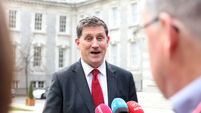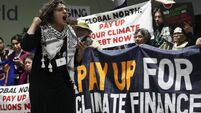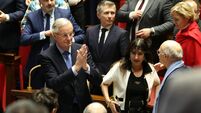The future of global climate finance hangs in the balance

Activists participate in a demonstration for climate finance at the Cop29 UN Climate Summit in Baku, Azerbaijan. Picture: AP Photo
The Cop29 talks in Baku are reaching their climax with negotiators working around the clock to reach an agreement on global climate finance. This phase of Cop is sometimes called the “valley of death”, either negotiators achieve a rough consensus now that can be finessed in a final agreement, or we face a chaotic collapse of the world’s most important climate talks.
The job of the Cop negotiators over the next few days (officially the conference ends on Friday but it is likely to run into the weekend) is to agree who pays for global climate financing and how much, or in UN jargon, a New Collective Quantified Goal (NCQG).
A running theme at Cop29 has been arguing over which countries should qualify as “developed” or “developing” nations, and the implications for climate finance contributions. For example, China is a “developing” nation according to the UN classifications, which date back to 1992.
However, China’s economy has changed beyond recognition since the early 1990s. It has become the greatest manufacturing power the world has ever seen, and the largest emitter of carbon dioxide. Cop delegates from the world’s poorest countries ask why nations such as China have the same status as them.
A growing body of economic research shows that providing climate finance to developing countries is in the economic self-interest of richer nations, even if we forget about any notions of global solidarity or moral duty.
It can cost three times as much to build a solar farm in Africa versus Europe. This is even though solar irradiance is higher in Africa, which should mean higher energy yields and greater profitability.
The main reason for this discrepancy is project financing costs. One African Cop delegate complained that interest rates charged for renewable energy projects in their country were eight times higher than typical Western interest rates. A transparent and well-regulated system of climate project grants can overcome this. Some of this money must come from state funds, but there are signs of progress at Cop29 on new requirements for the private sector to contribute more. Levies on shipping, aviation, fossil fuel production, financial transactions, and cryptocurrencies are all under discussion.
There is no doubt that interference from the fossil fuel industry has slowed progress at Cop29. Attendee records show that at least 1,773 fossil fuels lobbyists have been given access to the event in Baku this year. This outnumbers almost every national delegation at the event. Saudi Arabia has been doing a particularly effective job of delaying the negotiations this year, as it tries to derail the pledge to transition away from fossil fuels that it reluctantly agreed to at last year’s Cop.
Cop negotiations have always been based on consensus. Every country or regional bloc involved needs to agree on decisions, and everyone gets to have their say. The idea is that the climate emergency is a global problem affecting every economic sector, and therefore solutions only work with buy-in from everyone. The negotiation process used at Cop is widely recognised as being fair and transparent, and as efficient as it can be given the complexity involved.
However, in a divided world with growing geopolitical tensions, many question whether this model can deliver the change needed quickly enough. The final negotiations at Cop29 will decide not only the future of climate finance, but the entire concept of a global, consensus-based approach to the climate emergency.
CLIMATE & SUSTAINABILITY HUB












